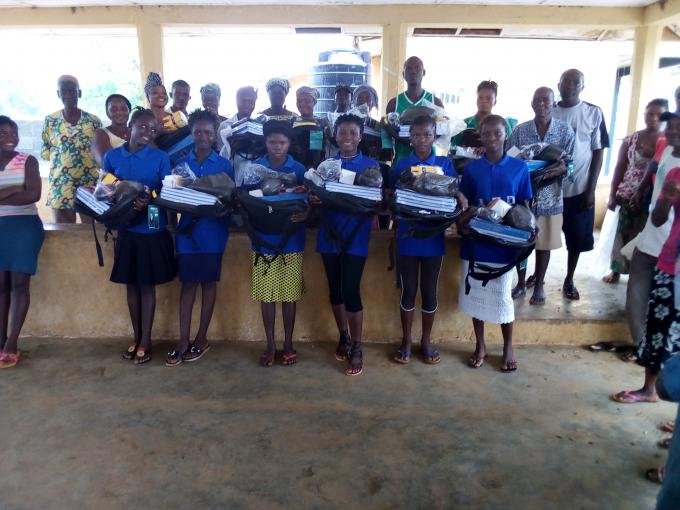Big win for the Accelerated Education Project as 82% Out of School children pass the National Primary School Examination in Pujehun District.
Jeremiah Sawyerr, Advocacy and Campaign Manager
Eighty-two percent of former out of school children that sat the National Primary School Examination (NPSE) in 2017 / 18 academic school year passed with an average score of 259/500 from the Accelerated Education Project (AEP) in Pujehun district. This is the first batch of 71 children (42 boys & 29 girls) that wrote the national examination who will now transition to secondary schools in the district.

Implemented in Pujehun district, the AEP aims to reach marginalised girls and boys in six communities, supporting them to return to school, stay in school and learn. The project is designed as a pilot of cost effective accelerated education that will enable out of school children to access learning and successfully re-enter the formal education system. It supports 717 out-of-school, overaged, young mothers and disadvantaged children aged 12-18, teachers, Ministry of education personnel and community stakeholders.
Head teacher Amie Konteh from Zimmi community, with the highest performing AEP expressed her delight over the results. “I feel so proud to be the head teacher of an AEP that has scored the highest average of 294. These results have shown that Out of School children have the willingness and capacity to return and complete primary education. They just need support from the community and their parents to achieve this, now that the AEP has been set up here”. She disclosed that the support of the AEP management committee and teachers was one of the main reasons why these children were able to achieve such great results.
Madam Amie Konneh, expressed hope that these children will continue to be supported by their parents and care givers as they transition to Junior Secondary School. She noted that the AEP approach, which caters for adolescent mothers, out of school, over aged and koranic children has created access and completion opportunities for primary education. “The AEP is a good approach that is contributing to increased literacy rates in our community”
Adding his voice, Ibrahim Yahaya Fofana, Deputy Director of the District Education Office (DEO) disclosed that proposals are now being developed to expand the AEP approach to other communities across chiefdoms in the district following the success of SCI’s AEP children in Pujehun. This will include enhanced community ownership and participation.
Lydia Kpana, SCI Education Adviser intimated that the project emanated after series of community consultations, and the outcome was to bring marginalized children back to school. The educationist said that due to the high level of poverty, the project was designed to cover tuition fees, uniform, shoes and learning materials for children enrolled in the project. Lydia noted that there has been significant milestones achieved under the AEP including setting up a monitoring database, monitoring tools for centres, development of training manuals and a collaborative working relationship between the DEO, District Education Committee (DEC) and civil society organizations in the district. She disclosed that SCI plans to hold a learning event to showcase the AEP approach, best practices and outcomes of the project since its inception in the coming months.
“The AEPs give renewed hope and priority to reach the most marginalized children whose parents or care givers died from Ebola, children form in koranic centres, child-headed households and from poor households in remote rural areas communities to return to school, stay in school and learn.”
She further disclosed that to support a conducive learning environment, 30 teachers (19 female & 11 male) were recruited and trained in collaboration with the Ministry of Education. The 6 AEP centres were rehabilitated and furnished adequately with furniture, teaching and learning materials, sanitation kits including; drinking buckets and cups, hand washing stations and soap. She concluded by saying 60 AEP management committees were trained to manage the centres, monitor attendance, conduct home visits to parents. Furthermore, the school curriculum has been modified to include life skills and reproduction health sessions to be taught in these centres.
 Sierra Leone
Sierra Leone